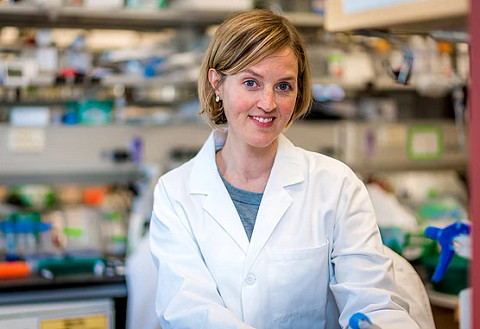
The Program for Young Adults with Breast Cancer brings together clinical researchers and scientists dedicated to improving our understanding of breast cancer in young adults, including the biology of the disease, response to therapy, psychosocial outcomes, and survivorship concerns.
As researchers continue to gather data and results from studies involving younger adults, they hope to uncover new details about how breast cancer is different in young adults and focus on issues that have been under-addressed in this age group.
Clinicians and researchers are optimistic that this work may help develop more effective, personalized care, guiding more young adults through the challenges of diagnosis, treatment, and long-term survivorship.
Current Studies
Helping Ourselves, Helping Others
In 2006, Ann Partridge, MD, MPH, launched the first multi-institutional cohort study of young women with breast cancer in the United States. The Young Women's Breast Cancer Study (known to participants as Helping Ourselves, Helping Others) has enrolled more than 1,300 young women. While the cohort is no longer enrolling patients, researchers will continue to survey participants for at least 10 years, tracking the medical and psychosocial issues these patients face at diagnosis, through treatment, and into survivorship.
To date, the study has explored several issues particular to young adults, including fertility concerns, sexual functioning, body image, genetic testing, differences in the time frame of diagnosis, and surgical decisions. Ongoing research includes a survey of patients' partners to better understand their concerns and needs as caregivers.
Participants are also asked to provide blood and tissue samples for biological analyses to better understand the unique biology of breast cancer in young adults. Some areas of interest include genetic risk factors that disproportionally affect young adults diagnosed with breast cancer, as well a better understanding the biology of metastatic disease, HER2+ tumors, and triple negative disease.
Dr. Partridge collaborates with medical oncologists at Dana-Farber and scientists at the Broad Institute, to examine genetic changes in very young patients using blood and tumor samples collected through the cohort. Through this work, the investigators are searching for novel genetic markers, beyond BRCA1 and BRCA2, which might explain why some people develop breast cancer at a young age. We hope findings from this research will lead to the identification of potential targets for tailored prevention and treatment strategies.
Improving Surgical Decision-Making in Young Adults with Breast Cancer
Shoshana Rosenberg, ScD, is the principal investigator of a study, sponsored in part by the Agency for Healthcare Research and Quality, that includes a qualitative assessment of surgical decision-making by young adults, from both the patient and physician perspective. Dr. Rosenberg is conducting in-person interviews with young patients prior to surgery as well as focus groups with breast cancer survivors about their surgical decision and experience.
Additionally, she is interviewing surgical oncologists, plastic surgeons, and medical and radiation oncologists about their experiences and how they communicate with breast cancer patients about local therapy decisions. Collectively, results from this qualitative assessment will inform a future phase of the research involving the design and development of a decision aid to help young adults make informed choices about their breast cancer surgery.
The POSITIVE (Pregnancy Outcome and Safety of Interrupting Therapy for Women with Endocrine Responsive Breast Cancer) Trial
Dr. Ann Partridge is the North American Principal Investigator for the POSITIVE trial. This clinical trial is a prospective observational study designed to support and evaluate disease, reproductive, and psychosocial outcomes for young adults who desire a pregnancy and at the same time are advised to receive 5-10 years of endocrine therapy for hormone receptor-positive early stage breast cancer. Enrolled participants would stop taking endocrine therapy between 18-30 months into this treatment in order to become pregnant. They would restart endocrine therapy to complete the planned duration of therapy.
Closed Studies
Studies that are closed to enrollment, but are in data analysis, include:
The Virtual Young Women's Initiative
Dr. Partridge received a three-year, American Society of Clinical Oncology (ASCO) Cancer Foundation Improving Cancer Care Grant to expand the domain of the Program for Young Adults with Breast Cancer into a national, virtual program called the Young and Strong Program.
The virtual program provided educational and support materials for young adults with breast cancer and their providers. The study compared a young patients' intervention arm to a contact-time, physical activity intervention arm. Patients in each arm were given a booklet, which included resource links, as well as access to a study website, which included videos from experts in the field. Print and website content was intended to help patients and their doctors understand and address the concerns of young adults.
This study is now closed to enrollment and is in data analysis. There have been three papers published to date. The team will use the findings to continue to refine the model of care for the Program for Young Adults with Breast Cancer to community cancer settings and study the effect of the expanded program on fertility issues and other measures of quality of care, satisfaction, and quality of life.
Young Adults and Fertility Issues
An internet-based survey of 1,700 young breast cancer survivors from across the United States identified a desire for better communication about fertility issues, as well as a need for research into treatments that preserve fertility among young breast cancer survivors. Other research regarding fertility and preservation strategies is being conducted in conjunction with the Brigham and Women's Reproductive Endocrinology and Infertility program as well as in collaboration with both national and international colleagues.